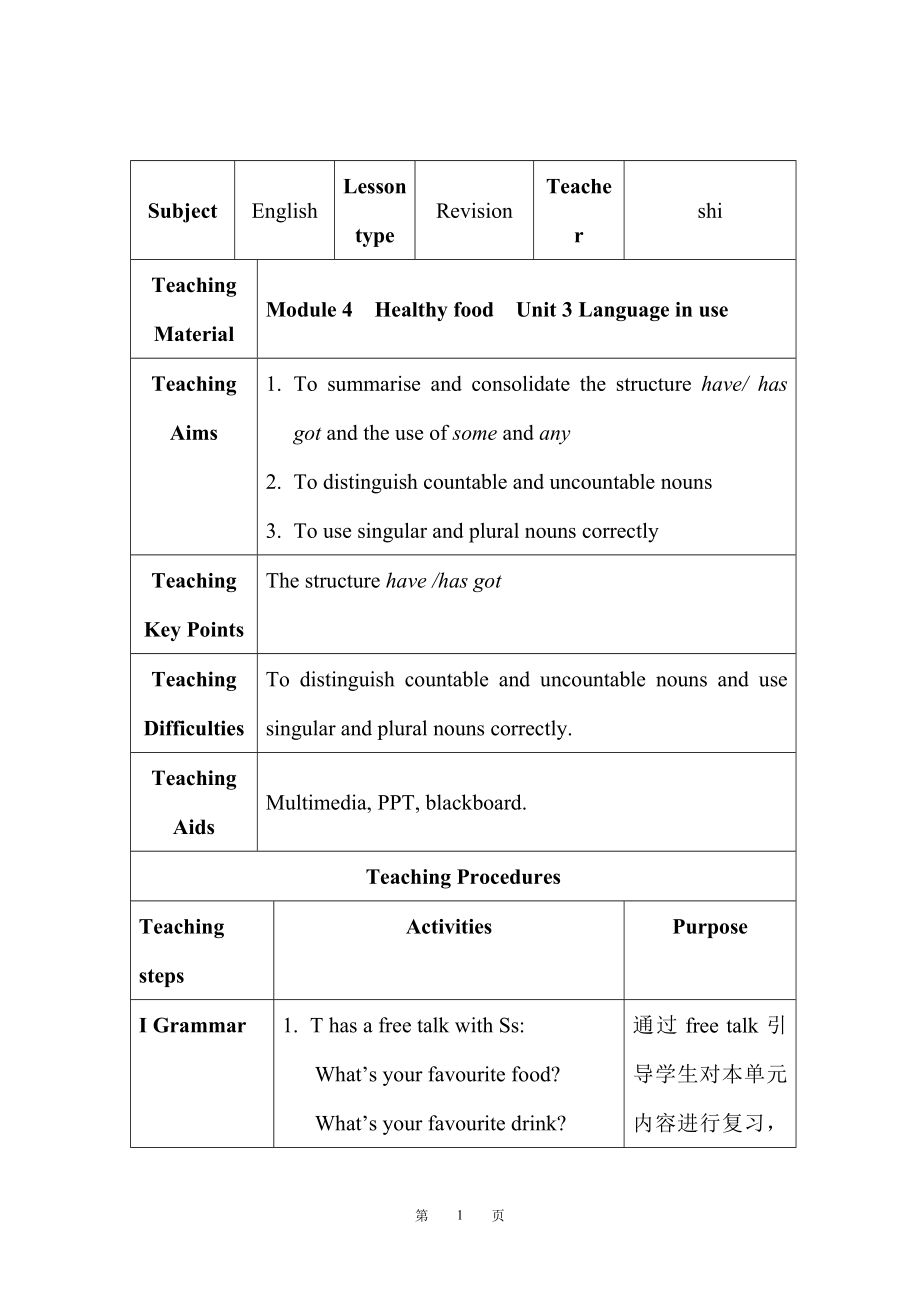《外研版七年級英語上冊Module 4 Healthy food Unit 3 Language in use.教案》由會員分享��,可在線閱讀����,更多相關(guān)《外研版七年級英語上冊Module 4 Healthy food Unit 3 Language in use.教案(4頁珍藏版)》請在裝配圖網(wǎng)上搜索。
1�����、
Subject
English
Lesson type
Revision
Teacher
shi
Teaching Material
Module 4 Healthy food Unit 3 Language in use
Teaching Aims
1. To summarise and consolidate the structure have/ has got and the use of some and any
2. To distinguish countable and uncountable nouns
3. To use singular
2��、and plural nouns correctly
Teaching Key Points
The structure have /has got
Teaching Difficulties
To distinguish countable and uncountable nouns and use singular and plural nouns correctly.
Teaching Aids
Multimedia, PPT, blackboard.
Teaching Procedures
Teaching steps
Activities
Purpose
I
3�、 Grammar
1. T has a free talk with Ss:
What’s your favourite food?
What’s your favourite drink?
Is it healthy food and drink?
2. Summarise singular and plural nouns of countable nouns and uncountable nouns.
3. Summarise the structure have/ has got and the use of some and any.
通過free t
4、alk引導(dǎo)學(xué)生對本單元內(nèi)容進(jìn)行復(fù)習(xí)�����,通過復(fù)習(xí)總結(jié)語法���。
ⅡPractice
1. Ask Ss to work in pairs, looking at the picture and talking about the food in the fridage. (Activity 1)
2. Ask Ss to do Activity 2 and 4.
讓學(xué)生通過口頭或筆頭的形式對模塊內(nèi)容進(jìn)行復(fù)習(xí)鞏固���,可以通過學(xué)生不同的層次進(jìn)行相應(yīng)的問答,給各個層次的學(xué)生都有發(fā)音的機(jī)會�。
ⅢAround the world
Lead Ss to go through the passage,
5����、 discussing it and telling the differences between Chinese and western breakfast.
讓學(xué)生感知西方早餐���,感受中西方飲食異同�����,同時讓學(xué)生在體驗中外文化的異同中形成跨文化意識�����。
ⅣModule task
1. Ss work in groups of four or five. Have them make a poster about a healthy breakfast.
1). Make a list of questions about a healthy breakfast.
2). Talk
6�����、to Ss from another group about a healthy breakfast.
3). Make a poster about students’ healthy breakfast.
2. Choose some good works.
學(xué)以致用���,并給學(xué)生搭建展示平臺�。
ⅤHomework
1. Exercise-book 2 M4U3.
2. Review Module 4.
學(xué)生可以對所學(xué)知識的鞏固和運用。
Blackboard designing
have got -Have/Has + 主語 + got + …?
haven’t got -Yes, 主語 + have/has.
has got - No, 主語 + haven’t/hasn’t.
hasn’t got
After-class
reflections
4
第 頁
 外研版七年級英語上冊Module 4 Healthy food Unit 3 Language in use.教案
外研版七年級英語上冊Module 4 Healthy food Unit 3 Language in use.教案

